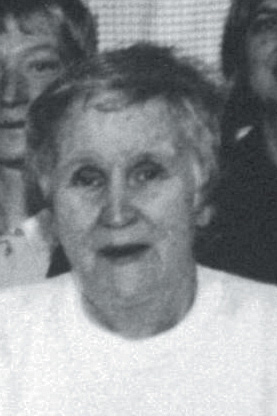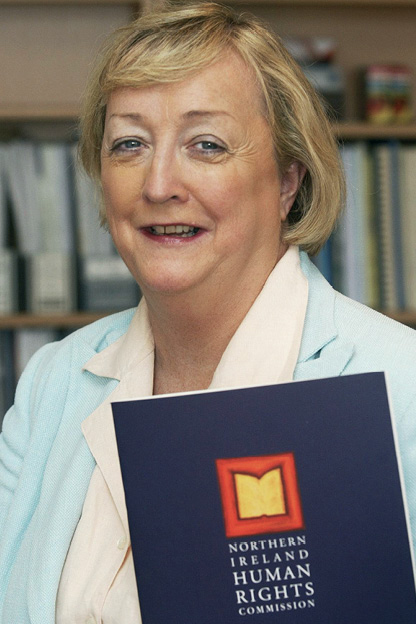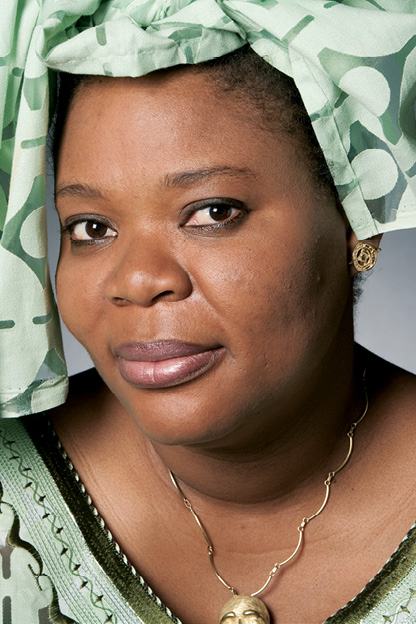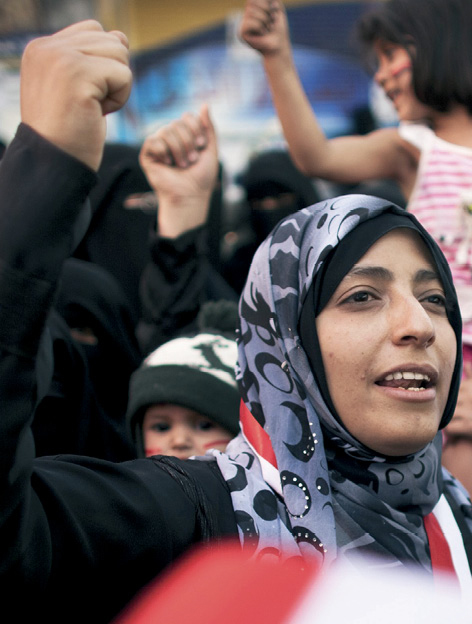The Peacemakers

JOYCE McCARTAN

MONICA McWILLIAMS

LEYMAH GBOWEE

TAWAKKOL KARMAN
Hillary
Increasingly we know that the security and peace of countries is related to the involvement of women in their societies and in peacemaking itself. Women, however, have traditionally been excluded from the work of ending conflicts, but there are examples where gutsy women have made a profound difference.
In the midst of the Troubles, a decades-long period of sectarian violence between Catholics and Protestants in Northern Ireland, women played critical roles—starting in 1976 when Máiread Maguire and Betty Williams won the Nobel Peace Prize for their efforts to encourage a peaceful resolution, through the signing of the Good Friday Agreement twenty-two years later in 1998.
When Bill and I first went to Belfast in 1995, I met a group of women who had come together at a time of violence and bitter conflict. One of them was sixty-five-year-old Joyce McCartan, a Catholic mother whose seventeen-year-old son had been shot dead by a Protestant gunman. All told, she had lost more than a dozen family members during the Troubles. Joyce refused to retreat into anger and grief, and instead brought together Protestant and Catholic women to set up a safe place where women of both communities could talk over a cup of tea, and Joyce invited me to join them.
Nine women sat around a small table at the Lamplighter Traditional Fish and Chips restaurant, drinking tea and talking about their hopes that the current cease-fire would continue and the violence would end once and for all. They told me how, after they had reached across their divide, they found that they had more in common than not. They may have attended different churches on Sunday, but they all said a prayer when their husbands and sons went off to work or out for the night. They all worried when their children left for school each morning. The deep-rooted causes of the violence—the terrors of sectarianism, the burdens of poverty, the despair of unemployment—touched all their lives. And in the end, for them and for so many other women across Northern Ireland, love of family ran deeper than calls to hatred.
These women didn’t stop being Catholic and Protestant. They didn’t believe in their faiths any less deeply. But they learned that they could understand one another and work together. Those kitchen-table conversations played an important role in the peace process, and as Joyce put it: “It takes women to bring men to their senses.” And these women simply would not take no for an answer.
Monica McWilliams, a Catholic, and Pearl Sagar, a Protestant, cofounded the Northern Ireland Women’s Coalition, which was granted two seats at the multiparty negotiations that led to the Good Friday Agreement. Mo Mowlam, the British secretary of state for Northern Ireland, urged that women be included in the negotiations.
Inez McCormack, a trade unionist and the first female president of the Irish Congress of Trade Unions, campaigned successfully for strong equality and human rights provisions in the agreement, stayed active in working for their implementation, and pushed for greater shared economic advantages so that people felt the benefits of peace. In 2011, Newsweek named her as one of its 150 women “who shake the world.”
Also back in 1995, Bill and I met a fourteen-year-old girl named Sharon Haughey, from Armagh, a town in Northern Ireland. She had written a letter expressing her hopes for peace: “Both sides have been hurt. Both sides will be hard to forgive.” Bill read part of that letter to the crowd at Belfast City Hall before we lit the Christmas tree. I stayed in touch with Sharon, and as she got older, she came to work for me as an intern in my Senate office. She learned a lot in Washington, and when she went home she got involved in local politics. At just twenty-four years old she was elected to the district council of her town. She worked hard and eventually became lord mayor of Armagh.
In 2012, I visited Belfast, and Sharon met me for lunch, wearing her ceremonial chain of office. She told me she was about to be married and hoped to start a family. When I saw her again in Dublin a few years later, she came with her three boys: sons who are growing up only learning about the Troubles in history books.
A world away, other women raised their voices for peace and justice. When the First Liberian Civil War started in 1989, Leymah Gbowee was just seventeen years old. She went, in her words, “from a child to an adult in a matter of hours.” As the conflict dragged on, she raised her children, became a social worker, and counseled survivors of trauma. What she saw convinced her that women have an essential role to play in promoting peace, and she set out to build a network of women across Liberia and West Africa who shared her conviction.
In 2003, Liberian women started saying to one another, “Enough is enough.” Leymah helped turn this discontent into a movement, organizing women in nonviolent protests. That spring, thousands of women from all walks of life—Christians and Muslims together—flooded the streets, marching, singing, and praying. Dressed all in white, they sat in a fish market in the hot sun under a banner: “The women of Liberia want peace now.”
First the warlords tried to ignore them. Then the warlords tried to force them to disperse. But the women wouldn’t leave. Finally, the warlords agreed to begin peace negotiations. But as the talks dragged on, the women became justifiably impatient. So Leymah led a delegation of women to the peace conference in neighboring Ghana and held a sit-in. They linked arms and blocked the doors and windows until the men inside reached an agreement. When security forces tried to arrest Leymah, she threatened to disrobe, which, according to traditional beliefs, would have brought a curse upon the men. Her threat worked, and it turned out to be an important turning point in the peace process. The story is captured in a documentary by Abigail Disney, Pray the Devil Back to Hell, and Leymah’s 2011 book, Mighty Be Our Powers.
I met Tawakkol Karman for the first time during my visit to Yemen in 2011 as secretary of state. Born seven years after Leymah in the city of Taiz, she, too, grew up against a backdrop of political upheaval. When she was eleven years old she witnessed first the unification of North and South Yemen then a civil war between the two sides that led to a repressive government.
“Because of women like us, I believe that in the end, tyranny will never succeed, and goodness will always vanquish evil. Although I may not see it in my lifetime, peace will overcome. I believe, I know, that if you have unshakable faith in yourself, in your sisters, and in the possibility of change, you can do almost anything.”
—LEYMAH GBOWEE
When she got older, Tawakkol became a journalist, reporting on the human rights abuses she saw. In 2005, she founded an organization, Women Journalists Without Chains, to provide training to up-and-coming journalists and to stand up for freedom of the press.
All around her, Tawakkol saw violence, authoritarianism, poverty, and relentless attempts to silence dissenting voices, including her own. As with Leymah, the more she saw, the more she felt she needed to do. In 2007, she started organizing weekly protests in Sana’a, the capital of Yemen, demanding the corrupt government be investigated. Even in the midst of chaos, Tawakkol kept her movement together and advocated for a nonviolent approach. (“We will not turn to violence, no matter what the government does,” she vowed to a reporter in 2011.) Even when the country’s president threatened Tawakkol’s brother that his sister would be killed for disobeying him, she didn’t retreat. She kept protesting until 2011, when she called on her fellow activists to channel their efforts into supporting the Arab Spring. They called her “Mother of the Revolution” and “the Iron Woman.” The conflict in Yemen eventually became a proxy war between Arab states and Iran, leading to a horrific humanitarian crisis. Tawakkol has persistently advocated that the UN Security Council pass a resolution demanding an end to the war and sponsor the political process to achieve that.
In 2011, Leymah and Tawakkol were awarded the Nobel Peace Prize, along with Liberian president Ellen Johnson Sirleaf, “for their nonviolent struggle for the safety of women and for women’s rights to full participation in peace-building work.” Their dedication to building peace, advancing reconciliation, and defending the rights of fellow citizens in their own countries is remarkable but not unique. Leymah and Tawakkol are shining examples of the difference women can make and the progress they can drive when given the opportunity to make decisions about the future of their societies and countries. In her book, Leymah reflected on what keeps her going: “The work is hard. The immensity of what needs to be done is discouraging. But you look at the communities that are struggling on a daily basis. They keep on—and in the eyes of the people there, you are a symbol of hope. And so you, too, must keep on. You are not at liberty to give up.”
As America’s first woman secretary of state, Madeleine Albright stood firm against the barbarism of the Bosnian War and the ethnic cleansing in Kosovo, including advocating the use of military force to end both conflicts. She famously said: “There’s a special place in hell for women who don’t help each other.” She and the other peacemakers I’ve met were determined to help women, children, and men by ending war. Some succeeded, some did not; but their bravery encouraged others to keep trying. In her most recent book, Fascism: A Warning, Madeleine poses a question that should be on all our minds, asking, “Who has the responsibility to uphold human rights? The answer to that is: everyone.”